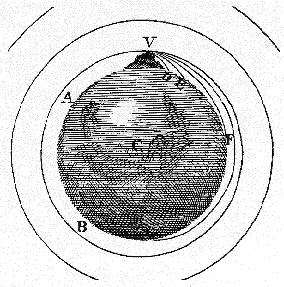Date: Thu Apr 26 18:39:03 2001
Posted By: Jason Goodman, Postdoctoral Fellow, Department of Geosciences
Area of science: Physics
ID: 987898700.Ph
Message:
What happens when you throw a rock straight up? It comes right back down.
So would the Space Shuttle, if it went straight up. The Shuttle isn't
powerful enough to escape the pull of Earth's gravity.
 So how does it stay up in space? The answer is given in one of the most
famous diagrams in physics, drawn by Isaac
Newton. Imagine a tall mountain (V) on the Earth, which sticks up
above the atmosphere. There's a cannon on the mountaintop which shoots
cannonballs horizontally at various speeds. Slow cannonballs (D) land
right next to the mountain; faster ones (E) land farther away. For even
faster cannonballs (F), the round Earth curves away from the path of the
cannonball. For very fast cannonballs (B), the Earth curves
enough that the cannonball never hits the ground at all! Instead, the
cannonball makes a complete "orbit" around the Earth. The cannonball is
constantly falling, but the Earth curves more than the ball's path does.
So how does it stay up in space? The answer is given in one of the most
famous diagrams in physics, drawn by Isaac
Newton. Imagine a tall mountain (V) on the Earth, which sticks up
above the atmosphere. There's a cannon on the mountaintop which shoots
cannonballs horizontally at various speeds. Slow cannonballs (D) land
right next to the mountain; faster ones (E) land farther away. For even
faster cannonballs (F), the round Earth curves away from the path of the
cannonball. For very fast cannonballs (B), the Earth curves
enough that the cannonball never hits the ground at all! Instead, the
cannonball makes a complete "orbit" around the Earth. The cannonball is
constantly falling, but the Earth curves more than the ball's path does.
There's a very
cool Java applet which will let you play with launching cannonballs
from Newton's mountain at various speeds.
The Space Shuttle orbits just like the cannonball, "falling" constantly
around the Earth but always missing the ground. The Space Shuttle's main
job is not to go high, but to go fast. It needs to pick up a
huge amount of horizontal speed (about 8 kilometers per second) to avoid
hitting the ground. To do so, it curves over from a vertical launch
position to a horizontal path as it leaves the launch area, firing its
engines horizontally.
This is kind of difficult to notice from the close-up photos you usually
see on television of a shuttle launch. I see you're in Florida; maybe
you've seen a launch in person, where I'd expect the curving path is much
more obvious.
Current Queue |
Current Queue for Physics |
Physics archives
Try the links in the MadSci Library for more information on Physics.
MadSci Home | Information |
Search |
Random Knowledge Generator |
MadSci Archives |
Mad Library | MAD Labs |
MAD FAQs |
Ask a ? |
Join Us! |
Help Support MadSci
MadSci Network,
webadmin@www.madsci.org
© 1995-2001. All rights reserved.
 So how does it stay up in space? The answer is given in one of the most
famous diagrams in physics, drawn by Isaac
Newton. Imagine a tall mountain (V) on the Earth, which sticks up
above the atmosphere. There's a cannon on the mountaintop which shoots
cannonballs horizontally at various speeds. Slow cannonballs (D) land
right next to the mountain; faster ones (E) land farther away. For even
faster cannonballs (F), the round Earth curves away from the path of the
cannonball. For very fast cannonballs (B), the Earth curves
enough that the cannonball never hits the ground at all! Instead, the
cannonball makes a complete "orbit" around the Earth. The cannonball is
constantly falling, but the Earth curves more than the ball's path does.
So how does it stay up in space? The answer is given in one of the most
famous diagrams in physics, drawn by Isaac
Newton. Imagine a tall mountain (V) on the Earth, which sticks up
above the atmosphere. There's a cannon on the mountaintop which shoots
cannonballs horizontally at various speeds. Slow cannonballs (D) land
right next to the mountain; faster ones (E) land farther away. For even
faster cannonballs (F), the round Earth curves away from the path of the
cannonball. For very fast cannonballs (B), the Earth curves
enough that the cannonball never hits the ground at all! Instead, the
cannonball makes a complete "orbit" around the Earth. The cannonball is
constantly falling, but the Earth curves more than the ball's path does.